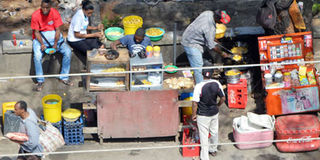Why food safety is a major national issue

An open air cafe on Nyerere Avenue in Mombasa on October 4, 2016. The dynamics surrounding food safety and nutrition are too vital to be ignored. PHOTO | KEVIN ODIT | NATION MEDIA GROUP
What you need to know:
- Our food has become a bolthole for heavy metals, pesticides, antibiotics or faecal matter.
- Robust policies and regulations should vet and accredit different actors in the value chain.
If you wish to lead a miserable life in Nairobi, think about food.
For instance, is the tomato you pick up at the grocery safe? And what of milk? Could it be laced with aflatoxin, a carcinogen?
And beef? Is it compromised through feeds or jabs? This and many other questions have turned eating from thrill to torment.
For a long time, the people have lived in some sort of fool’s paradise, eating without any care about the safety of the food.
And the authorities have remained aloof as poison is served to citizens.
Yet, the dynamics surrounding food safety and nutrition are too vital to be ignored.
Due to ignorance, greed or both, food production and handling pose a grave danger.
FOOD HANDLING
Our food has become a bolthole for heavy metals, pesticides, antibiotics or faecal matter.
Sadly, many consumers lack the rigour to interrogate the origin of the food we eat.
Thus, eating has turned out to be a feast on poison and a ticket to an early grave.
We also lack a national system of traceability and labelling that would afford consumers the power to make informed choices.
This is responsible for the many health complications we are grappling with today.
Cancers are traced to food handling and the pesticides used.
CANCER
In a 2015 study, ‘Smallholder Dilemma on the Emerging Kenyan Food Safety’, a researcher at Strathmore Business School, Nairobi, found that most of our fruits and vegetables have residues of heavy metals and pesticides.
Such residues are harmful, leading to birth defects or cancers.
A study by the International Livestock Research Institute (ILRI), found high aflatoxin levels in milk, thanks to contaminated feeds. Apart from bad feeds, cows are pumped with jabs of antibiotics. That is why there is a crisis of anti-biotic resistance. And, horticulture demands heavy usage of pesticides, most of which are poorly regulated.
Aflatoxin
That is why a stringent regime of traceability is vital. Consumers should be informed about the origin of the food, how it was produced, and the chemicals used, transportation, handling, preservation and storage.
Here, we only discuss food safety when a calamity strikes such in 2004, when 100 people died after consuming aflatoxin-contaminated maize in Makueni County.
AWARENESS
We need consumer education and awareness to engage the national and county governments on policies and regulation to defeat the monster of unsafe food.
Standardisation is critical. However, the standards are only geared towards exports.
Is the local consumer a lesser being? Charity begins home. A robust awareness and inspection system is needed.
Consumers must compel the authorities into action and make the entire value chain keener in ensuring safety in producing and handling food.
We desperately need a National Food Safety Authority to ensure that standards are adhered to.
The United States has the Food and Drug Administration (FDA) and also introduced the Food Safety and Modernisation Act (FSMA) 2011.
This Act, instead of being curative, became preventive as the US responded to food safety incidents, which it has tamed.
POLICIES
In Kenya, both the National Food Safety Policy and the National Food Nutrition and Security Policy ignore consumer sensitisation and involvement.
An empowered consumer will raise the red flag in the event of suspected adulteration.
Robust policies and regulations should vet and accredit different actors in the value chain and provide the consumer with the critical information for decision making.
Mr Wamanji is a public relations and communication adviser. [email protected] Twitter: @manjis





